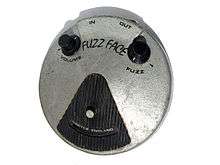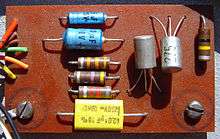Fuzz Face

The Fuzz Face is an effects pedal used mainly by electric guitarists and by some bass players. It is a stompbox designed to produce a distorted sound from an electric guitar, a sound referred to as "fuzz," which earlier was achieved sometimes by accident, through broken electrical components or damaged speakers.
History
Arbiter Electronics Ltd. first issued the Fuzz Face in 1966. Later units bear the "Dallas Arbiter", "Dallas Music Industries Ltd.", "CBS/Arbiter Ltd." or "Dunlop Manufacturing Inc." name.
The earliest units used germanium transistors. Silicon transistors were used in later editions of the pedal. Silicon transistors provided for a more stable operation, but have a different, harsher sound.
The electronics are contained in a circular-shaped metal housing. Ivor Arbiter "got the idea for the round shape when he one day saw a microphone stand with a cast iron base".[1] The design was originally intended to be used as a microphone base for guitarists who sang. The pedal uses two knobs, one for volume, and one for the amount of distortion the pedal produces. The arrangement of controls and logo on the box suggests a smiling face.
The circuit is based on the shunt-series-feedback amplifier topology - a standard in engineering textbooks. Sola Sound and Vox had been using the same circuit topology for some of their Tone Bender pedals earlier in 1966.[2]
Dallas Music Industries made a final batch of Fuzz Face units in 1976 or 1977, shortly after moving to the United States. The company bought Crest Audio in the 1980s and although it was operating under that name when it reissued the Fuzz Face in 1986, the units still bore the Dallas-Arbiter name. They made about 2000 Fuzz Faces until 1990.[3][4] In 1993 Dunlop Manufacturing took over production, making a variety of Fuzz Face units until this day. Several germanium and silicon models are available. In 2013 smaller versions with status LEDs and AC power jacks were introduced.[5]
In the late 1990s Arbiter reissued the pedal as well.[6]
Components
The circuit uses only a small number of components, plus a battery. Its sound is mostly dependent on the selection of transistors (type, hfe and leakage in case of germanium transistors). In addition, germanium transistors tend to be sensitive to temperature, so the sound produced using the box would change as the equipment heated up. According to Roger Mayer, his guitar tech, Hendrix would buy half a dozen Fuzz Faces and mark the one he liked best only to find out that he didn't like it in a different environment.[7]

Early units used NKT275 germanium transistors. Later on, BC183L, BC183KA, BC130C, BC108C, BC209C and BC239C silicon transistors were used. The American made versions used BC109C transistors.[1][8] Arbiter reissues used AC128s.[8] Hendrix also switched to the silicon transistors, but they created additional difficulties on stage, since they are much more susceptible to receiving AM radio signals, which were then audible through the guitar amplifier.[9]
Users
The Fuzz Face's continuing popularity and status as a classic may be explained by its many famous users. Among them are Jimi Hendrix,[10] David Gilmour,[11] Duane Allman,[12] Pete Townshend,[13]Eric Johnson[14] and George Harrison.[15][16]
References
- 1 2 "Fuzz Face" by David Morin
- ↑ "Pedal Porn - A Little History" by David Main
- ↑ 1980's Crest Audio FuzzFace reissue story
- ↑ Foxrox electronics scrapbook
- ↑ Music Radar - Namm 2013: Dunlop launches Fuzz Face Mini and MXR Talk Box
- ↑ Vintage Guitar: Arbiter Fuzz Face reissue
- ↑ Premier Guitar: Roger Mayer Talks Fuzz
- 1 2 Analog Man Sun Face and Fuzz Face Page
- ↑ Dregni, Michael (August 2012). "The Arbiter Fuzz Face". Vintage Guitar. pp. 62–64.
- ↑ Dunlop - Jimi Hendrix Fuzzface
- ↑ Gilmourish - Dallas Arbiter Fuzz Face
- ↑
- ↑ Who Tabs - Pete's Gear - Dallas Arbiter Fuzz Face
- ↑ Modern Guitars - Eric Johnson Interview
- ↑ "Get Back" by the Beatles; Apple, London, 1969
- ↑ "Beatles Gear" by Andy Babiuk and Tony Bacon; Backbeat, 2002
External links
- R.G. Keen: The Technology of the Fuzz Face
- Fuzz Central: Arbiter Fuzz Face; Schematics
- Jim Dunlop Manufacturing